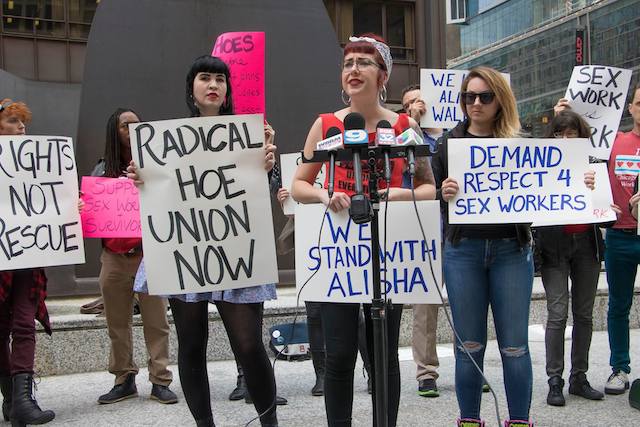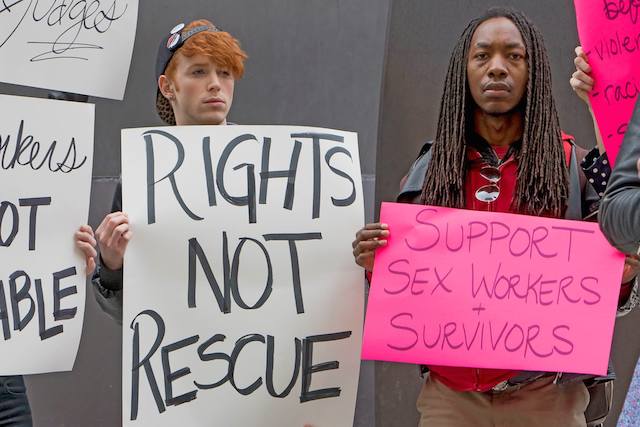Activists Say Sex Worker Was 'Wrongfully' Convicted Of Murder In South Side Stabbing
By Mae Rice in News on Apr 1, 2016 4:32PM

The demonstration at Daley Plaza (photo courtesy of Erica Friscioni)
On Thursday, about 20 sex workers and sex worker allies took to Daley Plaza to show solidarity with Alisha Walker, a 23-year-old woman sentenced to 15 years in prison after fatally stabbing a client while working as a sex worker in 2014. Walker was convicted of second-degree homicide in the case, though her attorneys argue that she stabbed Alan Filan, a 61-year-old teacher at South Side Catholic school Brother Rice High School, in self-defense.
The group of demonstrators met at Daley Plaza's Picasso sculpture at 1 p.m. to "show our solidarity with our sister who was wrongfully convicted," they said in a statement. They spent "a good hour" in the plaza, Erica Friscioni, a spokesperson for the event and a sex worker herself, told Chicagoist.
At the demonstration, Friscioni held a sign that read "Demand respect for sex workers"; her friend had an "amazing" sign, she added, that read "Radical Hoe Union Now." "As with any other kind of job," Friscioni said, sex workers need to "help protect each other [and] have people who stand for us."
"Sex workers... we're everywhere," Friscioni continued. "It's not always the stereotype situation you would think of. We are not looking to hurt people. Clients don't hire us, and we want to stab them... that's never the motivation."
Instead, many sex workers get into the industry as "a way to survive" and "stabilize your economic situation" in a world where a "living wage" is hard to come by, Friscioni said. (She believes this is why Walker became a sex worker.) However, sex work can be dangerous, for women and especially for transgender women; Friscioni noted that sex workers are often raped and murdered, and "it's hard to even keep stats on that," as many crimes against sex workers go unreported. This is in part because sex workers receive very limited legal protection.

The demonstration at Daley Plaza Thursday (photo courtesy of Erica Friscioni)
"We could all be Alisha," Cathryn Berarovich, 25, told the Tribune at the Daley Plaza demonstration. "Because our work is criminalized, there is no recourse for when bad things happen to us. We're standing up for someone who did what she had to do to survive, then was punished for surviving."
In their statement before the demonstration, Friscioni and her fellow activists attributed what they view as Walker's wrongful conviction to anti-sex-worker bias in the legal system and the media, calling out the Sun-Times report on Walker's sentencing, in particular, for its "whorephobic and shaming" language.
In that piece, the paper described Walker with terms like "the prostitute" and "hooker." ("Hooker" was originally used in the article's headline and has since been replaced with "prostitute," but the term "hooker" is still visible in the article URL.) The Sun-Times article referred to Filan, meanwhile, as a "wonderful father," in a quote from Filan's brother, lobbyist William Filan. The harshest terminology the piece used for him is "less than an ideal citizen." This is in spite of the fact that Walker alleges Filan was the aggressor in their confrontation, threatening her with a kitchen knife because she and another woman declined to have unprotected sex with him. Filan had also reportedly been drinking at the time of their confrontation.
The already-biased Sun-Times piece reported similarly anti-sex-worker language and reasoning from the judge in Walker's case, Cook County Judge James Obbish. As he handed down Walker's sentence last week, the Sun-Times reports:
The judge noted Walker’s lack of remorse immediately after the incident, but he also waxed on at length about her decision to work as a prostitute even though she had been arrested for walking the streets before.Sex Workers Outreach Project (SWOP) released a statement on Walker's case Thursday, too, expressing solidarity with her and the Daley Plaza demonstrators, noting the ways the legal process was biased against Walker because of her profession, and calling out the larger ramifications of this bias.Obbish berated Walker for choosing a “dangerous,” unsavory lifestyle and for expressing loyalty to her pimp who was nothing but as “animal who sucked money” out of her while she “humiliated” herself by performing sex acts with strangers.
If Walker hadn’t been concerned about handing off money to her pimp, perhaps Filan would be alive, Obbish said.
“She wasn’t walking out of there without her money, and that’s why we’re here today,” the judge said.
"Ultimately, we are concerned that a marginalized woman was not given fair treatment by our justice system," the SWOP statement reads. It goes on, "This bias contradicts social justice principles and the core values of American society, and it deters people involved in the sex trade and members of other marginalized groups from reaching out to law enforcement and social services when they have been the victim of violence, and ultimately promotes violence against them."
Walker's confrontation with Filan took place on Jan. 18, 2014. Three days after that date, Filan's body was found, stabbed repeatedly. (The Sun-Times reports he was stabbed 14 times; the Tribune, 13.)
The incident began when Filan invited Walker and another woman to his Orland Park home, and agreed to pay them both for half an hour of sex. Then, according to Walker's attorneys, she stabbed him in self-defense. Prosecutors, on the other hand, won the case arguing that Walker was the aggressor in the confrontation, and stabbed Filan in a dispute over money.